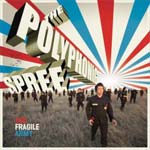| |

$21.99 CD


|
|
MIHALY VIG
Film Music from the Films of Bela Tarr
(Periferic)
 |
"Kortanc I" |
 |
"Valuska" |
Let me say first of all that it isn't necessary to have already
seen the films of Hungarian auteur Bela Tarr to enjoy this incredibly
rich CD. It is enough that it happens to be beautiful, varied, original,
distinctly Eastern European, and yet strangely universal at the
same time. Much like the films actually, that this music was created
to accompany. Bela Tarr is probably one of the most singular filmmakers
alive today, and not to sound too terribly pretentious, but if you've
ever sat and watched a Tarkovsky movie and bemoaned the fact that
people just don't make 'em like they used to, then Bela Tarr may
offer some consolation. They're highly stylized, almost always black
and white, and shot with looooong takes that consist of slow action
and subverted narratives. They're also unremittingly melancholy
and impossible to forget. Susan Sontag was a vocal champion of his
work, and Gus Van Sant claims he stopped making movies like Good
Will Hunting and Finding Forrester after seeing Tarr's
seven-plus-hour magnum opus Satantango, which will finally
be released on DVD later this month. He's worked with his composer
Mihaly Vig since 1983, and the CD at hand is comprised of the scores
he wrote for the movies Almanac of Fall, Damnation, Satantango, and Werkmeister Harmonies.
Tarr has stated that he uses music, along with time, as a main
character in his films. And while the films aren't ever saturated
with music per se, the role it plays is highly prominent and one
of the key elements in what makes his movies so highly memorable.
Generally, film music is composed after the movie has been completed,
but Tarr and Vig do the exact opposite; Vig writes the music first
and Tarr finds a way to make it work within his vision. In the
films of Bela Tarr, there is often a sense of impending doom,
collapse, and disintegration. And yet I've read that Tarr himself
actually considers his films to be hopeful, in the same sense
that Chekhov is. I hadn't quite understood what he meant until
listening to this CD over and over again, when I realized that
most of the pieces here, even at their darkest, are almost entirely
lacking uneasiness. It is as if they were created in counterpoint
to the dread inherent in the human condition. In Damnation,
the center of action takes place at a cabaret/nightclub called
The Titanic, that has long since seen its glory days. It's to
the soft bellowing of an accordion that Titanic's patrons hang
onto the last thread their humanity. The world seems to stand
precipitously close to the abyss in his film Werkmeister Harmonies,
yet the fifteen minutes of music that Vig wrote for it and which
accompany the film's most evocative scenes is almost celestially
hopeful. Those fifteen minutes of music alone are reason enough
to buy this album; it's one of the most beautiful things you'll
hear all year. [MK] |
|






























